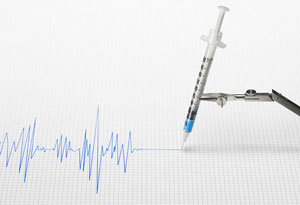The Truth About Hormone Therapy

Photo: Kagen Mcleod
Two menopause experts set the record straight on bioidenticals, breast cancer risk, and more.
Ever felt like the only thing that fluctuates more than a menopausal woman's hormone levels is expert opinion on hormone therapy? You're not alone. When the National Association of Nurse Practitioners in Women's Health (NPWH) recently surveyed its members, nearly 80 percent said their patients were in the dark about hormonal treatment options for menopause. Susan Wysocki, a nurse practitioner and president of the NPWH, and Alan Altman, MD, a gynecologist specializing in perimenopausal and postmenopausal care, sort out the facts.
Hormone therapy will seriously imperil your health.
"Compared with women who don't take hormones, those who start oral hormone therapy [HT] after age 60 have a greater risk of heart attacks and dementia," says Altman. "However, the latest research shows that beginning HT before age 60 can have the opposite effect: Women who do so have a 32 percent decreased risk of heart attack and a 65 percent decreased risk of Alzheimer's." Taking estrogen combined with progestin can increase your chances of developing breast cancer, but going off HT within five years seems to minimize any additional risk.
A blood test can determine the amount of hormones you need.
"Perimenopausal women's hormones fluctuate so much that blood tests are all but meaningless," Altman says. "These tests are also based on the false idea that there's a standard, ideal amount of estrogen for everyone." A woman with a low blood-hormone level may have no menopausal symptoms, while a woman with a higher blood level could be sweating through the dead of winter. "The best way to determine how much estrogen you need is simply to see how your symptoms respond to treatment," says Altman. "Your doctor should start you off with a very low dose. After a month, if you're still suffering, you may need to recalibrate upward."
Compounded bioidenticals are totally different from FDA-approved bioidenticals
"Advertisers have led women to believe that compounded hormones are safer than FDA-approved products," Wysocki says. But don't let the marketing fool you. "Many contain estradiol, the same hormone found in standard prescription patches, creams, and gels that's 100 percent identical to what your body produces," says Altman. However, there is one important difference between FDA-approved bioidenticals and compounded formulas, which are hand-mixed by a pharmacist. "With FDA-approved HT, you get the same amount of hormones in every dose," says Altman. "And even small fluctuations can make a big difference in how you feel."
The safest way to get estrogen is through your skin, with a patch, cream, or gel.
Like every oral medication, estrogen taken in pill form travels through the digestive system and liver before it's absorbed into the bloodstream. "That's not a problem for many prescription drugs, but when estrogen hits the liver, it triggers the production of proteins that raise the risk of blood clots," Altman says. "When you use a skin patch or vaginal cream, on the other hand, the estrogen is absorbed straight into the bloodstream—with no increased risk of clots."
More Health Stories



